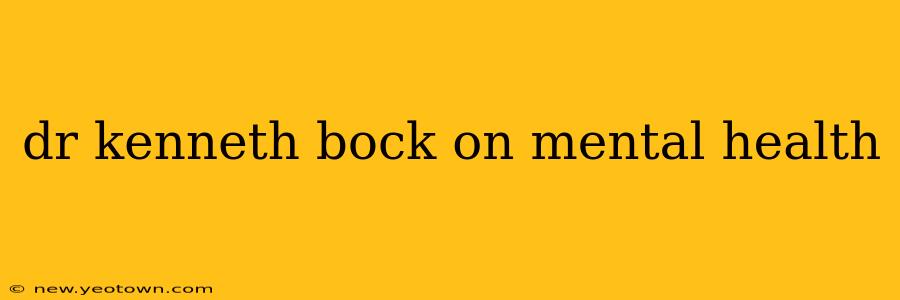Dr. Kenneth Bock isn't your typical psychiatrist. His approach to mental health is revolutionary, shifting the focus from solely pharmaceutical interventions to a holistic understanding of the body-mind connection. He believes that many mental health issues stem from underlying physical problems, a perspective that’s gaining traction in the field but remains surprisingly uncommon in mainstream practice. This exploration delves into Dr. Bock’s philosophy, his key concepts, and the impact he’s having on the way we understand and treat mental illness.
Imagine this: you're struggling with anxiety, depression, or even ADHD. You visit a doctor, receive a prescription, and the cycle continues. Dr. Bock challenges this conventional approach. His journey began with a personal experience – witnessing the transformative power of addressing underlying physical issues in his own life. This personal transformation ignited a passion for exploring the intricate relationship between the brain, the gut, and the overall health of the body.
What are Dr. Kenneth Bock's Core Beliefs?
Dr. Bock's core belief revolves around the idea that mental illness is often a symptom, not the disease itself. He posits that imbalances in the body – nutritional deficiencies, gut dysbiosis (an imbalance of gut bacteria), chronic infections, and environmental toxins – can significantly impact brain function and contribute to mental health struggles. He meticulously investigates these underlying factors, often employing a range of diagnostic tools beyond standard psychiatric assessments. His philosophy emphasizes a personalized, patient-centered approach, tailoring treatment plans based on the unique biological profile of each individual.
What conditions does Dr. Bock treat?
Dr. Bock's expertise spans a wide range of conditions, including but not limited to:
- Anxiety disorders: He examines the role of gut health, inflammation, and nutritional deficiencies in contributing to anxiety.
- Depression: He looks beyond chemical imbalances, exploring the role of infections, toxic exposures, and metabolic factors.
- ADHD: Dr. Bock investigates the potential impact of food sensitivities, gut issues, and underlying infections in the development and management of ADHD.
- Autism Spectrum Disorder: Similar to ADHD, his approach explores the interplay of various biological factors in autism.
How does Dr. Bock's approach differ from traditional psychiatry?
Traditional psychiatry often focuses primarily on medication management and psychotherapy. While these are valuable tools, Dr. Bock's approach goes further. He advocates for:
- Comprehensive testing: This includes blood tests, stool analysis, and other assessments to identify underlying physical issues.
- Nutritional interventions: He emphasizes optimizing diet and nutrient intake to support brain health.
- Addressing infections: He often treats underlying infections believed to contribute to mental health issues.
- Environmental detoxification: He assesses and addresses the potential impact of environmental toxins.
- Lifestyle modifications: He incorporates lifestyle changes such as exercise, sleep hygiene, and stress reduction techniques.
Does Dr. Kenneth Bock use medication?
While Dr. Bock strongly advocates for holistic approaches, he doesn't entirely rule out medication. He might use medication as a supplement to his holistic treatment plan, particularly in acute situations or when other interventions aren't enough. However, his focus remains on addressing the root cause of the problem, not just masking the symptoms.
What are the criticisms of Dr. Bock's approach?
While Dr. Bock's work has resonated with many, it's important to acknowledge that his approach isn't universally accepted within the medical community. Some criticisms include:
- Lack of rigorous scientific evidence: While many of his concepts are supported by research, more large-scale, controlled studies are needed to fully validate his approach.
- Potential for misdiagnosis: The holistic approach requires careful interpretation, and there's a risk of misdiagnosing or overlooking genuine psychiatric conditions.
- Cost and accessibility: The comprehensive testing and treatments he recommends can be expensive and may not be accessible to all patients.
Conclusion:
Dr. Kenneth Bock’s work presents a compelling alternative within the field of mental health. His focus on a holistic approach, addressing the root causes of mental health challenges, is shifting the paradigm and prompting a deeper investigation into the mind-body connection. While his methods require further validation through research, his contributions to a more comprehensive understanding of mental health are undeniably significant. His work encourages a more nuanced conversation about mental health, emphasizing the importance of a patient-centered approach that considers the whole person, not just their symptoms. Remember to always consult with your own physician before making any significant changes to your treatment plan.

